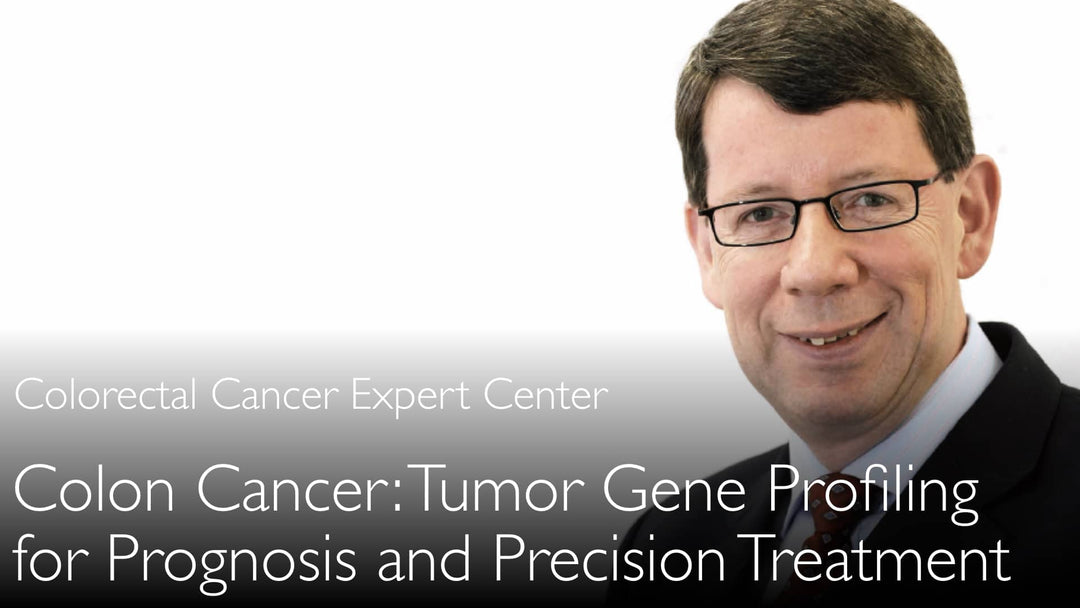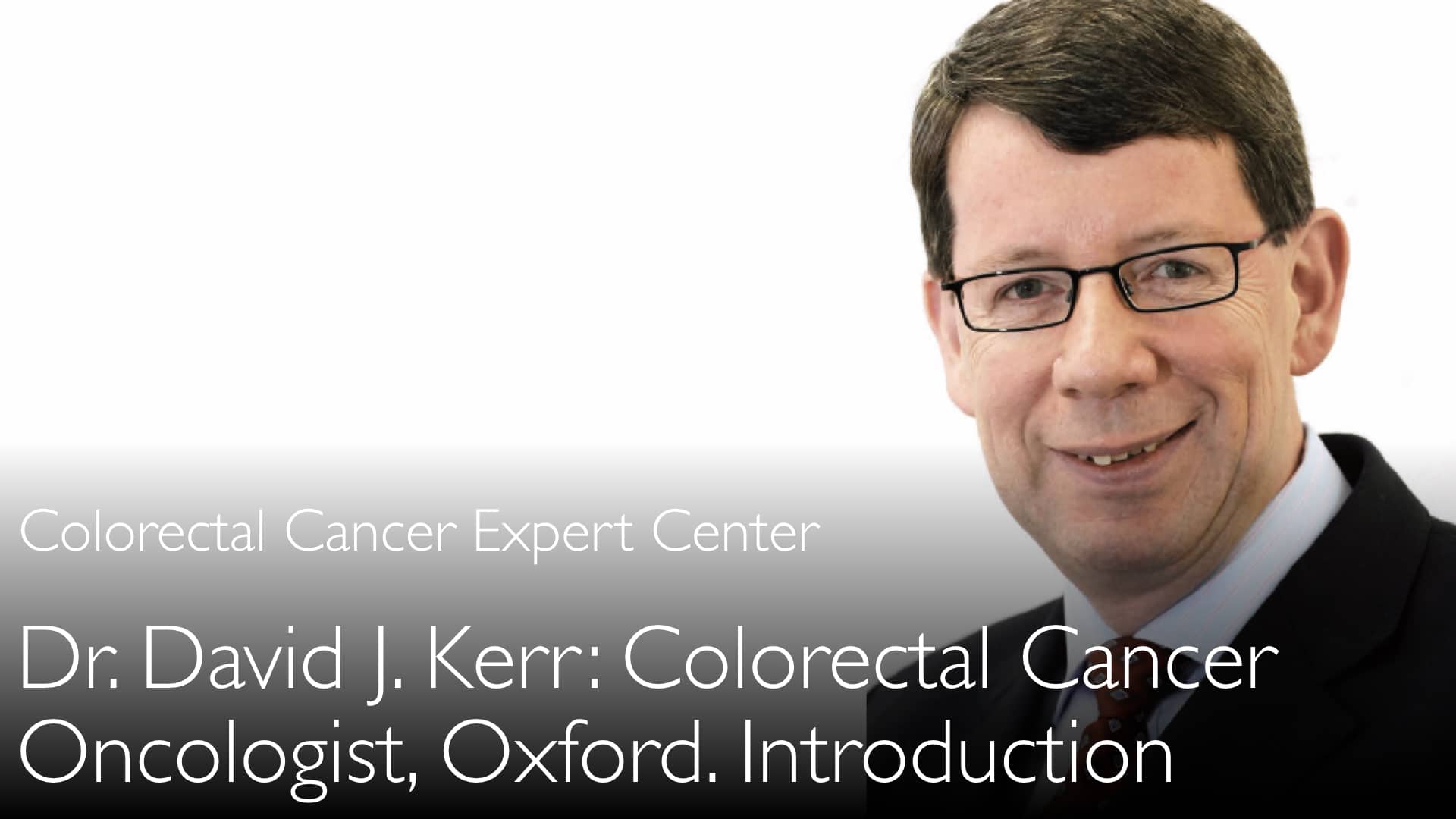מומחה מוביל בסרטן המעי הגס, ד"ר דייוויד קר, MD, מסביר כיצד פרופיל גנטי של הגידול והחולה יכול לחזות יעילות ורעילות של כימותרפיה, ומאפשר רפואה מותאמת אישית אמיתית. גישה זו מזהה חולי סרטן מעי גס שלב 2 שייהנו מטיפול משלים (adjuvant therapy) ואלה שיכולים להימנע ממנו בבטחה, תוך חיזוי אילו חולים נמצאים בסיכון גבוה לתופעות לוואי חמורות מהטיפול, ובכך משפרת תוצאות ומפחיתה נזק מיותר.
חיזוי תגובה ורעילות לכימותרפיה בסרטן המעי הגס באמצעות פרופיל גנטי
קפיצה לפרק
- רפואה מותאמת אישית בטיפול בסרטן המעי הגס
- חתימה גנטית של 7 גנים לפרוגנוזה ותועלת כימותרפית
- חיזוי רעילות כימותרפיה באמצעות גנטיקה חולה
- פרופיל גנטי מגידולים מוטבעים בפרפין סטנדרטי
- שילוב נתונים גנטיים מגידול ומאכסן להחלטות טיפול
- צמצום כימותרפיה מיותרת בסרטן מעי גס שלב 2
- עתיד האונקולוגיה המותאמת אישית לסרטן המעי הגס
רפואה מותאמת אישית בטיפול בסרטן המעי הגס
הרפואה המותאמת אישית מחוללת מהפכה בטיפול בסרטן המעי הגס בכך שהיא חורגת מגישת "מידה אחת מתאימה לכולם". ד"ר דייוויד קר, MD, מומחה מוביל לסרטן המעי הגס מאוקספורד, מדגיש את הצורך הקריטי להתאים אישית את הטיפול. זה חשוב במיוחד בסרטן מעי גס שלב 2, שם התועלת של כימותרפיה אדג'ובנטית היא שולית עבור רוב החולים. ד"ר אנטון טיטוב, MD, מאיר את הסטטיסטיקה העגומה: טיפול ב-100 חולי שלב 2 עשוי לרפא רק 3 או 4, בעוד שעד 40% נחשפים לרעילות משמעותית ולנטל של שישה חודשי טיפול.
חתימה גנטית של 7 גנים לפרוגנוזה ותועלת כימותרפית
מחקר פורץ דרך בהובלת ד"ר דייוויד קר, MD, בשיתוף Genomic Health ו-NSABP, ניתח 4,000 חולי סרטן מעי גס. המחקר זיהה חתימה ספציפית של ביטוי 7 גנים מ-RNA גידולי. חתימה זו מזהה באופן עוצמתי חולי שלב 2 בסיכון גבוה להישנות אשר צפויים להפיק את המירב מכימותרפיה אדג'ובנטית. מנגד, היא גם מצביעה על חולים עם פרוגנוזה מצוינת עבורם הסיכון מכימותרפיה עולה על כל תועלת אפשרית, ומאפשרת להם להימנע בבטחה מטיפול רעיל לאחר ניתוח.
חיזוי רעילות כימותרפיה באמצעות גנטיקה חולה
חיזוי יעילות הוא רק חלק אחד ממשוואת הרפואה המותאמת אישית. ד"ר דייוויד קר, MD, מתמקד גם בחיזוי רעילות, או "toxnostics". באמצעות מחקרי אסוציאציה גנומיים רחבים, צוותו זיהה וריאנטים גנטיים גרמינליים (SNPs) המצביעים על אילו חולים צפויים לפתח תופעות לוואי מסכנות חיים או חמורות מכימותרפיה. פרופיל גנטי זה מאפשר לאונקולוגים להתאים מראש מינוני כימותרפיה או, במקרים קיצוניים בהם סיכון התמותה מרעילות גבוה מאוד, להימנע מכימותרפיה altogether עבור חולה ספציפי.
פרופיל גנטי מגידולים מוטבעים בפרפין סטנדרטי
הישג מפתח שהופך מדע זה לישים באופן נרחב הוא השימוש בבלוקים גידוליים סטנדרטיים מוטבעים בפרפין. ד"ר דייוויד קר, MD, מציין כי מיצוי RNA מדגימות אלו, אשר כל מעבדה פתולוגית בעולם מטפלת בהן routinely, הוא קשה טכנית אך בר-השגה. זה מבטל את הצורך ברקמת גידול קפואה טרייה שקשה להשגה, והופך פרופיל מולקולרי מתוחכם לנגיש לקליניקות ברחבי העולם, לא רק למרכזים אקדמיים גדולים כמו אוקספורד. ד"ר אנטון טיטוב, MD, מאשר שזהו הישג קריטי לדמוקרטיזציה של רפואה מותאמת אישית.
שילוב נתונים גנטיים מגידול ומאכסן להחלטות טיפול
התמונה המלאה ביותר לקבלת החלטות טיפול מגיעה משילוב נתונים הן מהגידול והן מהאכסן – החולה. ד"ר דייוויד קר, MD, מדגיש שהגנטיקה של סרטן המעי הגס ושל החולה קשורות intimately. גישה הוליסטית המשלבת ידע על ביולוגיית הגידול עם התגובה הגנטית של החולה לכימותרפיה מעלה את הרפואה המותאמת אישית לרמה חדשה. ניתוח כפול זה מספק מבט מקיף על יעילות הטיפול ועל רעילות פוטנציאלית, ומדריך טיפול truly personalized.
צמצום כימותרפיה מיותרת בסרטן מעי גס שלב 2
ההשפעה הקלינית של פרופיל גנטי זה היא profound בצמצום טיפול יתר. עבור סרטן מעי גס שלב 2, רוב החולים עוברים כימותרפיה ללא הפיקת תועלת כלשהי. חתימת 7 הגנים מתייחסת directly לבעיה זו על ידי זיהוי תת-הקבוצה הקטנה של חולים בסיכון גבוה הזקוקים לטיפול, והקבוצה הגדולה יותר עם סיכון נמוך להישנות אשר ניתן לחסוך מהם את הרעילות, אי-הנוחות החברתית, והעלות הכספית של כימותרפיה מיותרת.
עתיד האונקולוגיה המותאמת אישית לסרטן המעי הגס
עבודתו של ד"ר דייוויד קר, MD, מצביעה על עתיד בו כל תוכנית טיפול לסרטן המעי הגס מותאמת individually. על ידי יישום פרופיל גנטי הן לפרוגנוזה והן לחיזוי רעילות, אונקולוגים יכולים למקסם efficacy טיפולית while minimizing harm. זה מייצג את pinnacle של אונקולוגיה מותאמת אישית, ומבטיח שהחולה הנכון מקבל את התרופה הנכונה במינון הנכון, ובסופו של דבר משפר שיעורי הישרדות ואיכות חיים עבור חולי סרטן המעי הגס worldwide.
תמליל מלא
ד"ר אנטון טיטוב, MD: כיצד פרופיל גנטי של סרטן המעי הגס מסייע בזיהוי חולים שעלולים לחוות רעילות משמעותית מכימותרפיה? שימוש ב-DNA ו-RNA גידולי ובנתונים גנטיים של חולה לחיזוי efficacy טיפול בסרטן מעי גס. מי לא יזדקק לכימותרפיה מערכתית לאחר כריתה של סרטן מעי גס ראשוני?
אתה כותב, "עלינו לטפל בכימותרפיה במאה חולי סרטן מעי גס שלב 2 כדי לרפא 3 או 4 חולי סרטן מעי גס. עד 40% מחולי סרטן המעי הגס המטופלים יסבלו מרעילות משמעותית. הם יתמודדו עם אי-נוחות חברתית ולעיתים כספית distinct של כימותרפיה אמבולטורית לסרטן המעי הגס למשך שישה חודשים."
פיתחת שיטה particular של פרופיל גנטי לסרטן המעי הגס. היא helpful בזיהוי אותם חולי סרטן מעי גס שיפיקו את המירב מהכימותרפיה. האם תוכל discuss גילוי פרופיל גנטי זה? כיצד הוא מסייע בבחירת טיפול personalized לסרטן המעי הגס?
ד"ר דייוויד קר, MD: אמרת זאת very well. בדקנו סמנים פרוגנוסטיים עבור חולי סרטן מעי גס. ביצענו ניסוי גדול בשיתוף החברה Genomic Health. הוצאנו RNA גידולי מסרטן מעי גס מבלוקים גידוליים מוטבעים בפרפין.
למה זה חשוב? כי כל מעבדה פתולוגית בעולם very good בטיפול בדגימות גידול מוטבעות בפרפין. זה נותן לנו בסיס דגימות גידול large לעבוד עליו. מיצוי RNA לפרופיל מולקולרי מדגימת גידול מוטבעת הוא difficult technically.
עבדנו על פרופיל גנומי של סרטן מעי גס עם Genomic Health ועם NSABP, קבוצת ניסויים קליניים אמריקאית large. חקרנו 4,000 חולים עם סרטן מעי גס. זיהינו קבוצה של 7 גנים.
7 גנים אלו יכולים לזהות חולי סרטן מעי גס שלב 2 who were most at risk of הישנות סרטן. דפוס הביטוי של 7 גנים אלו הראה מידע important. הוא זיהה חולים שיפיקו תועלת מכימותרפיה אדג'ובנטית לטיפול בסרטן מעי גס שלב 2 לאחר ניתוח.
7 גנים אלו גם זיהו חולי סרטן מעי גס עם פרוגנוזה excellent. הסיכוי שה-SPECIFIC_CANCER שלהם יחזור would be very small. הם לא יפיקו תועלת מכימותרפיה אדג'ובנטית לאחר הסרה כירורגית של סרטן מעי גס.
כפי שאמרת, פרופיל גנטי של הגידול would avoid טיפול יתר excessive בחולי סרטן מעי גס עם כימותרפיה potentially toxic. some patients would not benefit מכימותרפיה לסרטן מעי גס לאחר טיפול כירורגי.
It is important להסתכל על פרופילי RNA בגידולי סרטן מעי גס. But it is also important להסתכל על תגובת החולה לרעילות לאחר טיפול עם כימותרפיה לסרטן מעי גס. This helps to predict תופעות לוואי של כימותרפיה לסרטן מעי גס.
בדיוק השלמנו מחקר אסוציאציה גנומי רחב. זיהינו וריאנטים גנטיים גרמינליים (SNPs). This will tell us אילו חולי סרטן מעי גס most likely to develop רעילות מסכנת חיים או serious. We call this "toxnostics".
פרסמנו מאמר Nature Reviews על שיטה זו. שיטת פרופיל גנטי זו allows us in advance לזהות those חולי סרטן מעי גס who are likely to get serious toxicity. We then can להתאים מינוני כימותרפיה לסרטן מעי גס.
In some cases, we can למצוא חולי סרטן מעי גס for whom הסיכון למוות מרעילות כימותרפיה is very high. These חולי סרטן should avoid כימותרפיה altogether.
ד"ר אנטון טיטוב, MD: Putting together פרופיל גנטי של גידול ואכסן gives us a very complete picture. We can למצוא those patients who would benefit most מכימותרפיה לסרטן מעי גס.
It's a true personalized medicine example. You study not only the tumor, but also the patients. Precision medicine on both sides is an example of modern טיפול בסרטן מעי גס.
ד"ר דייוויד קר, MD: Exactly! We cannot להתעלם מגנטיקה של both גידול סרטן מעי גס ושל "אכסן" שלו, החולה. The two are intimately linked together. We have to לטפל בחולה סרטן המעי הגס whole. We do not treat just the גידול סרטן מעי גס.
We cannot לטפל בסרטן מעי גס independently of the patient. We have to לשלב את הידע על ביולוגיית גידול סרטן מעי גס עם how the אכסן (החולה) responds to כימותרפיה on a genetic level.
This approach allows us to look at both sides of cancer treatment. It takes precision medicine to treat חולי סרטן מעי גס to a new level. We combine efficacy and toxicity knowledge to treat חולי סרטן מעי גס.
ד"ר אנטון טיטוב, MD: As you highlighted, no special preparation of דגימת גידול is required. Therefore ההכנה הסטנדרטית של ביופסיית סרטן מעי גס או כריתה כירורגית של גידול can be applied to בדיקת microarray DNA.
ד"ר דייוויד קר, MD: Profiling מולקולרי של גידול סרטן מעי גס on דגימות מוטבעות בפרפין makes it so much easier. Because it is difficult to obtain דגימות גידול קפואות טריות in large quantities. It’s a problem even in a sophisticated clinic like Oxford.
Getting רקמת גידול סרטן מעי גס קפואה טרייה from the patient into the laboratory is difficult. Even our fantastic מעבדה פתולוגית has problems with it.
ד"ר אנטון טיטוב, MD: Profiling גנטי של גידול מעי גס from גידולים מוטבעים בפרפין makes it much easier. Our science then can be used by many more laboratories around the world.
This is a very important achievement. It helps to treat patients further. It will help to reduce רעילות טיפול בסרטן מעי גס. It will improve efficacy of טיפול בסרטן מעי גס.
ד"ר דייוויד קר, MD: We will apply precision medicine (personalized medicine) to טיפול בסרטן מעי גס. We will identify better prognostic factors. סמנים מולקולריים גידוליים predict פרוגנוזה סרטן מעי גס ורעילות טיפול. Profiling גנים גידולי helps to select best טיפול לסרטן מעי גס.





